Unit 4 Don't eat in class 重要知识考点总结
文档属性
| 名称 | Unit 4 Don't eat in class 重要知识考点总结 |
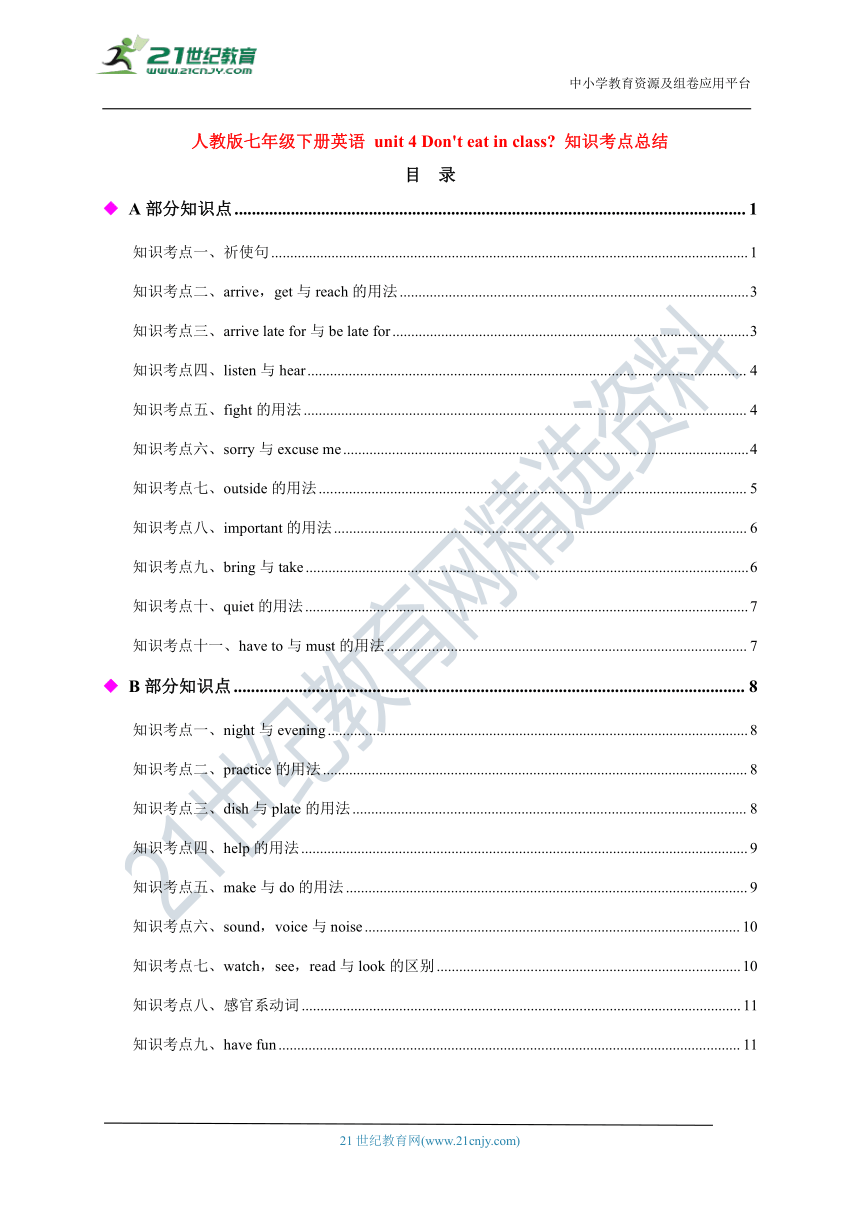
|
|
| 格式 | zip | ||
| 文件大小 | 1022.3KB | ||
| 资源类型 | 试卷 | ||
| 版本资源 | 人教新目标(Go for it)版 | ||
| 科目 | 英语 | ||
| 更新时间 | 2021-04-22 18:52:43 | ||
图片预览

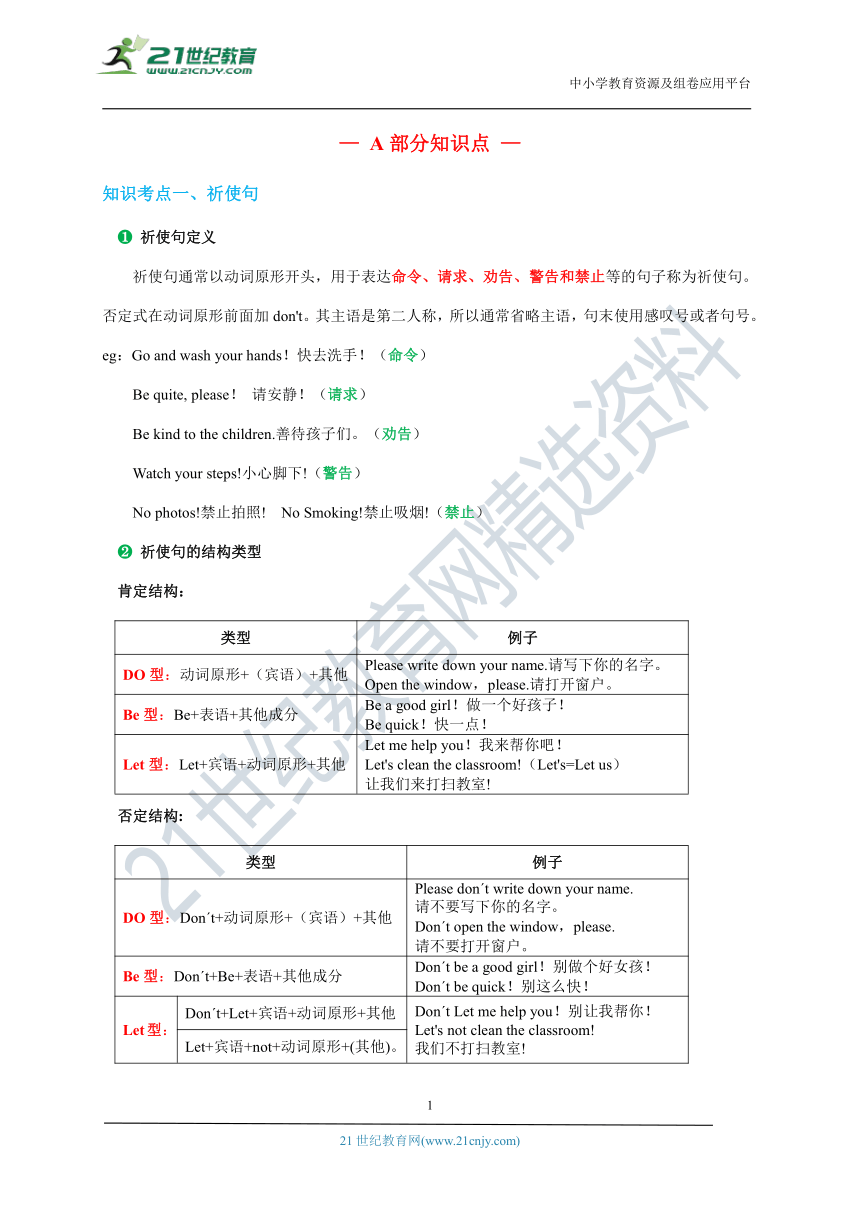
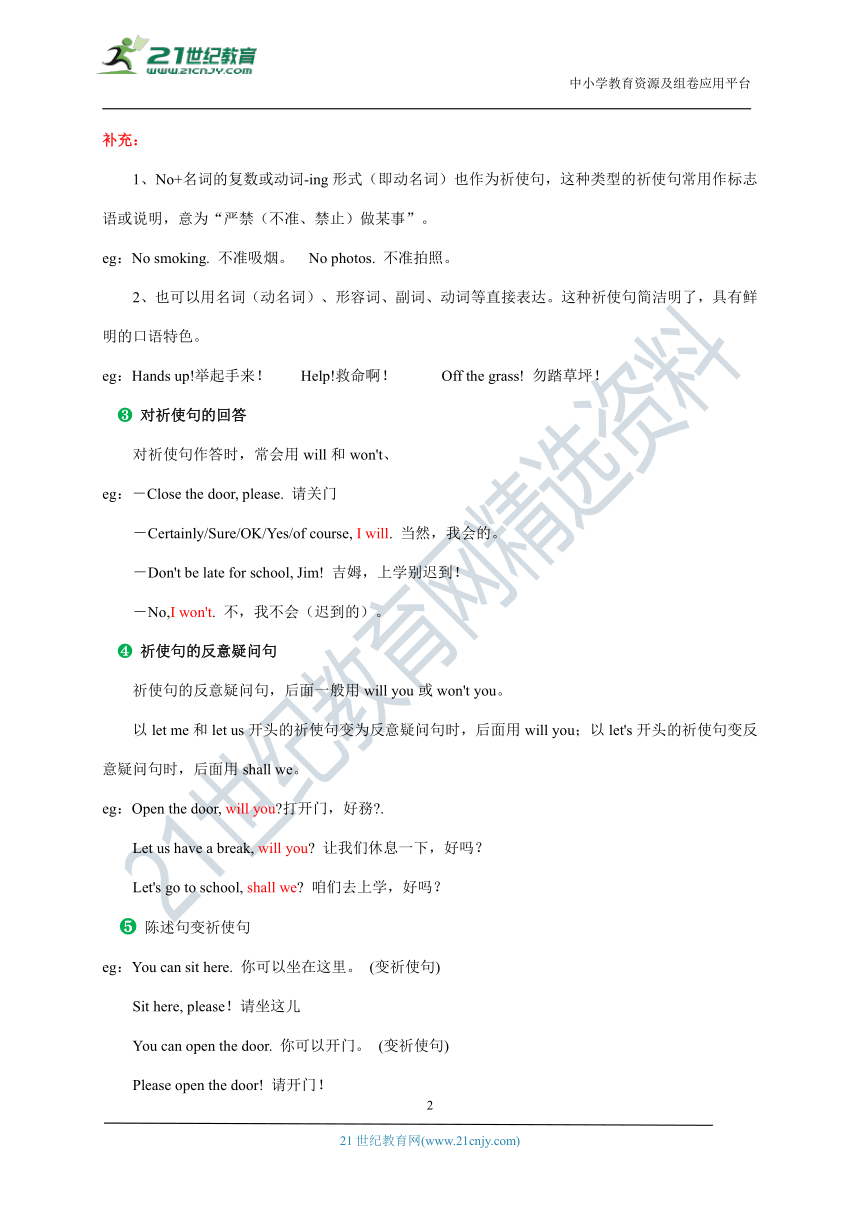
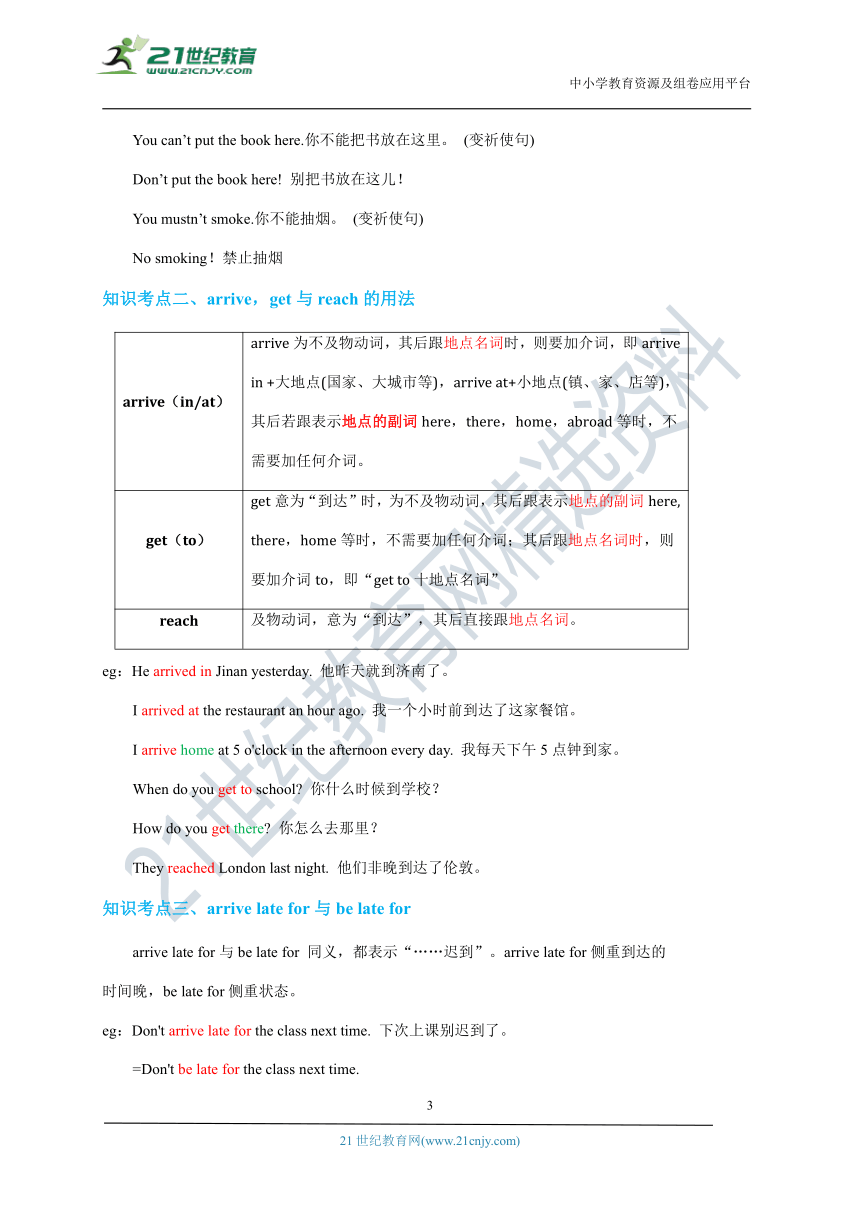
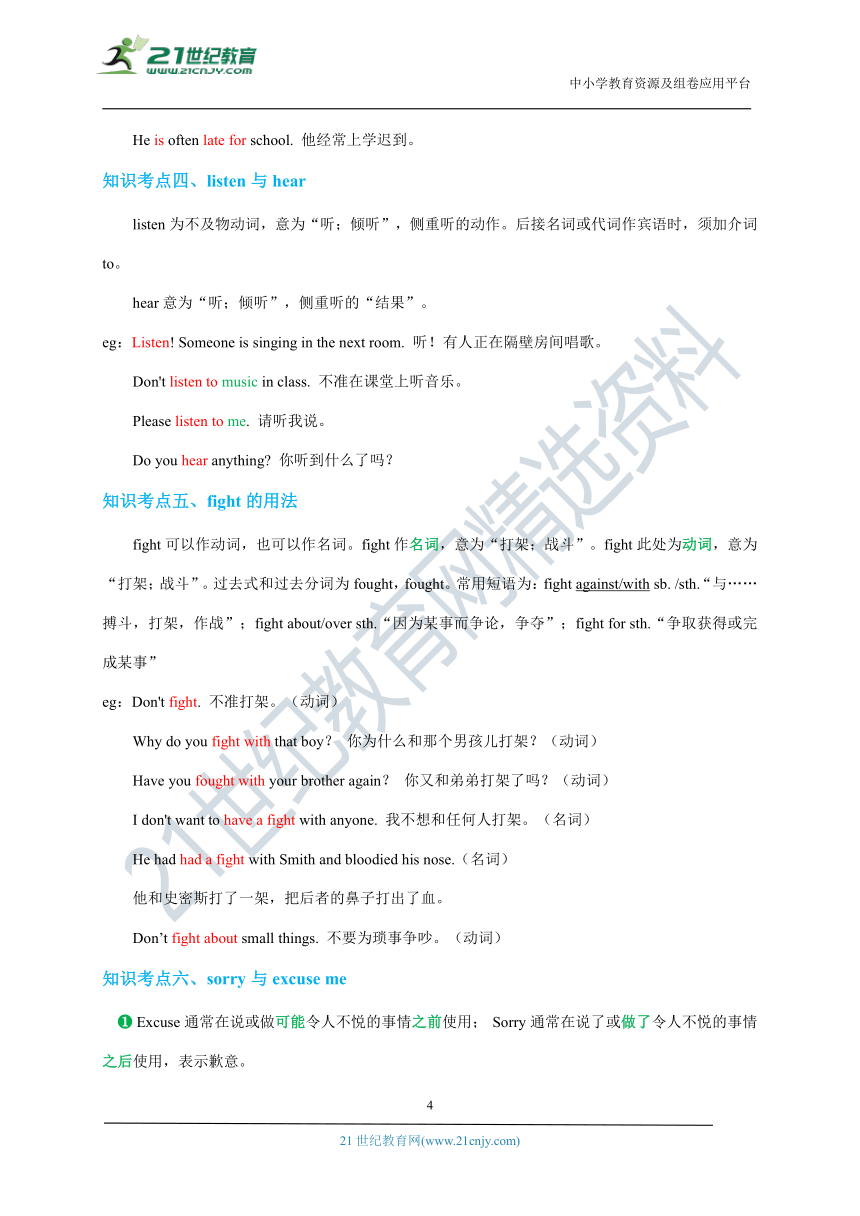
文档简介
人教版七年级下册英语
unit
4
Don't
eat
in
class?
知识考点总结
目
录
A部分知识点
1
知识考点一、祈使句
1
知识考点二、arrive,get与reach的用法
3
知识考点三、arrive
late
for与be
late
for
3
知识考点四、listen与hear
4
知识考点五、fight的用法
4
知识考点六、sorry与excuse
me
4
知识考点七、outside的用法
5
知识考点八、important的用法
6
知识考点九、bring与take
6
知识考点十、quiet的用法
7
知识考点十一、have
to与must的用法
7
B部分知识点
8
知识考点一、night与evening
8
知识考点二、practice的用法
8
知识考点三、dish与plate的用法
8
知识考点四、help的用法
9
知识考点五、make与do的用法
9
知识考点六、sound,voice与noise
10
知识考点七、watch,see,read与look的区别
10
知识考点八、感官系动词
11
知识考点九、have
fun
11
中小学教育资源及组卷应用平台
21世纪教育网(www.21cnjy.com)
—
A部分知识点
—
知识考点一、祈使句
?
祈使句定义
祈使句通常以动词原形开头,用于表达命令、请求、劝告、警告和禁止等的句子称为祈使句。否定式在动词原形前面加don't。其主语是第二人称,所以通常省略主语,句末使用感叹号或者句号。
eg:Go
and
wash
your
hands!快去洗手!(命令)
Be
quite,
please!
请安静!(请求)
Be
kind
to
the
children.善待孩子们。(劝告)
Watch
your
steps!小心脚下!(警告)
No
photos!禁止拍照!
No
Smoking!禁止吸烟!(禁止)
?
祈使句的结构类型
肯定结构:
类型
例子
DO型:动词原形+(宾语)+其他
Please
write
down
your
name.请写下你的名字。
Open
the
window,please.请打开窗户。
Be型:Be+表语+其他成分
Be
a
good
girl!做一个好孩子!
Be
quick!快一点!
Let型:Let+宾语+动词原形+其他
Let
me
help
you!我来帮你吧!
Let's
clean
the
classroom!(Let's=Let
us)
让我们来打扫教室!
否定结构:
类型
例子
DO型:Don?t+动词原形+(宾语)+其他
Please
don?t
write
down
your
name.
请不要写下你的名字。
Don?t
open
the
window,please.
请不要打开窗户。
Be型:Don?t+Be+表语+其他成分
Don?t
be
a
good
girl!别做个好女孩!
Don?t
be
quick!别这么快!
Let型:
Don?t+Let+宾语+动词原形+其他
Don?t
Let
me
help
you!别让我帮你!
Let's
not
clean
the
classroom!
我们不打扫教室!
Let+宾语+not+动词原形+(其他)。
补充:
1、No+名词的复数或动词-ing形式(即动名词)也作为祈使句,这种类型的祈使句常用作标志语或说明,意为“严禁(不准、禁止)做某事”。
eg:No
smoking.
不准吸烟。
No
photos.
不准拍照。
2、也可以用名词(动名词)、形容词、副词、动词等直接表达。这种祈使句简洁明了,具有鲜明的口语特色。
eg:Hands
up!举起手来!
Help!救命啊!
Off
the
grass!
勿踏草坪!
?
对祈使句的回答
对祈使句作答时,常会用will和won't、
eg:-Close
the
door,
please.
请关门
-Certainly/Sure/OK/Yes/of
course,
I
will.
当然,我会的。
-Don't
be
late
for
school,
Jim!
吉姆,上学别迟到!
-No,I
won't.
不,我不会(迟到的)。
?
祈使句的反意疑问句
祈使句的反意疑问句,后面一般用will
you或won't
you。
以let
me和let
us开头的祈使句变为反意疑问句时,后面用will
you;以let's开头的祈使句变反意疑问句时,后面用shall
we。
eg:Open
the
door,
will
you?打开门,好務?.
Let
us
have
a
break,
will
you?
让我们休息一下,好吗?
Let's
go
to
school,
shall
we?
咱们去上学,好吗?
?
陈述句变祈使句
eg:You
can
sit
here.
你可以坐在这里。
(变祈使句)
Sit
here,
please!请坐这儿
You
can
open
the
door.
你可以开门。
(变祈使句)
Please
open
the
door!
请开门!
You
can’t
put
the
book
here.你不能把书放在这里。
(变祈使句)
Don’t
put
the
book
here!
别把书放在这儿!
You
mustn’t
smoke.你不能抽烟。
(变祈使句)
No
smoking!禁止抽烟
知识考点二、arrive,get与reach的用法
arrive(in/at)
arrive为不及物动词,其后跟地点名词时,则要加介词,即arrive
in
+大地点(国家、大城市等),arrive
at+小地点(镇、家、店等),其后若跟表示地点的副词here,there,home,abroad等时,不需要加任何介词。
get(to)
get意为“到达”时,为不及物动词,其后跟表示地点的副词here,
there,home等时,不需要加任何介词;其后跟地点名词时,则要加介词to,即“get
to十地点名词”
reach
及物动词,意为“到达”,其后直接跟地点名词。
eg:He
arrived
in
Jinan
yesterday.
他昨天就到济南了。
I
arrived
at
the
restaurant
an
hour
ago.
我一个小时前到达了这家餐馆。
I
arrive
home
at
5
o'clock
in
the
afternoon
every
day.
我每天下午5点钟到家。
When
do
you
get
to
school?
你什么时候到学校?
How
do
you
get
there?
你怎么去那里?
They
reached
London
last
night.
他们非晚到达了伦敦。
知识考点三、arrive
late
for与be
late
for
arrive
late
for与be
late
for
同义,都表示“……迟到”。arrive
late
for侧重到达的
时间晚,be
late
for侧重状态。
eg:Don't
arrive
late
for
the
class
next
time.
下次上课别迟到了。
=Don't
be
late
for
the
class
next
time.
He
is
often
late
for
school.
他经常上学迟到。
知识考点四、listen与hear
listen为不及物动词,意为“听;倾听”,侧重听的动作。后接名词或代词作宾语时,须加介词to。
hear意为“听;倾听”,侧重听的“结果”。
eg:Listen!
Someone
is
singing
in
the
next
room.
听!有人正在隔壁房间唱歌。
Don't
listen
to
music
in
class.
不准在课堂上听音乐。
Please
listen
to
me.
请听我说。
Do
you
hear
anything?
你听到什么了吗?
知识考点五、fight的用法
fight可以作动词,也可以作名词。fight作名词,意为“打架;战斗”。fight此处为动词,意为“打架;战斗”。过去式和过去分词为fought,fought。常用短语为:fight
against/with
sb.
/sth.“与……搏斗,打架,作战”;fight
about/over
sth.“因为某事而争论,争夺”;fight
for
sth.“争取获得或完成某事”
eg:Don't
fight.
不准打架。(动词)
Why
do
you
fight
with
that
boy?
你为什么和那个男孩儿打架?(动词)
Have
you
fought
with
your
brother
again?
你又和弟弟打架了吗?(动词)
I
don't
want
to
have
a
fight
with
anyone.
我不想和任何人打架。(名词)
He
had
had
a
fight
with
Smith
and
bloodied
his
nose.(名词)
他和史密斯打了一架,把后者的鼻子打出了血。
Don’t
fight
about
small
things.
不要为琐事争吵。(动词)
知识考点六、sorry与excuse
me
?
Excuse通常在说或做可能令人不悦的事情之前使用;
Sorry通常在说了或做了令人不悦的事情之后使用,表示歉意。
eg:Excuse
me,
could
I
get
past?
对不起,我可以借过吗?
Oh,
sorry.
Did
I
step
on
your
foot?
哦,抱歉,我踩到你的脚了吗?
?
虽然Excuse
me和Sorry都有“对不起”的意思,但是Sony要比Excuse
me的程度深。
◆
Excuse
me可以用于引起别人的注意,表示“对不起,打扰了”
eg:Excuse
me,
what
time
is
it
now?
对不起,现在在几点了?
◆
Sorry用来表示歉意。
eg:Sorry,
I
am
late.
对不起,我迟到了。
知识考点七、outside的用法
outside由“out
+
side”构成,outside可用作形容词,副词,介词和名词。具体如下:
?
形容词adj.
外部的,室外的,外面的;外表的
eg:The
outside
parts
of
some
fruits
are
not
good
to
eat.
有些水果的外部不好吃。
The
outside
walls
are
damp.
外墙潮湿。
?
介词prep.
向……外面,在……外面。
eg:Outside
the
house
there
was
a
notice
saying
“For
Sale”.
房子外面有一张告示,上面写着“出售”。
You
can
park
your
car
outside
our
house
.
你可以把车停在我们家外面。
?
名词n.
外表,外部,外界,外围。
eg:The
outside
of
an
orange
is
bitter,
but
the
inside
is
sweet.
橘子的外表是苦的,但里面是甜的。
The
outside
of
the
house
needs
painting.
房子的外面需要油漆一下。
?
副词
adv“在外面。外面地,向外面”反义词inside意为“在室内,在里面”。
eg:The
box
was
red
outside
and
green
inside.
盒子外面是红色的,里面是绿色的。
Listen
to
music
outside.
在外面听音乐
Go
outside
and
see
if
it's
raining.
去外边看看是否在下雨。
?
out
of
表示“从……里面岀来”,是介词短语,着重从里到外的动作,在句中运用时,out
of后要跟名词,代词等宾语,其反义词是into,多用于一些动词之后。
eg:Don't
look
out
of
the
window.
别往窗外看。
知识考点八、important的用法
important形容词,意为“重要的”,常与连系动词连用作表语,也可作定语,放在所修饰的名词前面。其名词为importance,意为“重要性;重大”。常用句型为It’s
important
(for
sb.)
to
do
sth.
意为“做某事(对某人来说)是重要的”。
eg:This
is
very
important.
There
is
an
important
meeting
this
afternoon.
今天下午有一个重要的会议。
It’s
important
for
us
to
learn
English
well.
对我们来说学好英语是重要的。
We
all
realized
the
importance
of
learning
English.
我们都意识到学习英语的重要性。
知识考点九、bring与take
bring为及物动词,意为“带来;取来”,bring表示运动轨迹由远及近。bring
sth.
/sb.
to……意为“把某物/某人带到……”。反义词为take,意为“拿走”。take表示运动轨迹由近及远,也表示随身携带。
eg:Can
we
bring
music
players
to
school?
我们可以带音乐播放器到学校吗?
Please
bring
your
homework
to
school
tomorrow.
请明天把你的作业带到学校。
Next
time
don't
forget
to
bring
me
a
book.
下次不要忘了带一本书给我。
It's
raining
outside,
please
take
an
umbrella.
外面正在下雨,请带一把伞。
Take
the
umbrella
with
you.
你随身带把伞。
知识考点十、quiet的用法
quiet作形容词,意为“安静的”,通常在句中作定语或表语。
quite作副词,意为“很,非常”,注意quiet与quite两个单词的拼写。
eg:Oh,
and
we
also
have
to
be
quiet
in
the
library.
哦,而且我们还必须在图书馆里保
持安静。
Please
be
quiet.请保持安静。
The
streets
are
usually
quiet
at
night.
晚上街上通常很安静。
知识考点十一、have
to与must的用法
?
must
与
have
to
的强调重点不同两者都表示“必须”,但
must
侧重于说话者的主观看法,认为有必要或有义务去做某事;have
to则重于客观需要,含有“不得
不”或“被迫”之意。
eg:We
must
go
at
once.
我们必须马上就走。
If
I
buy
that
car,
I’ll
have
to
borrow
some
money.
如果我要买那辆汽车,
我得借些钱。
?
must
与
have
to
的时态形式不同,must
只有现在时一种形式(在宾语从句中可以表示过去),而
have
to则有多种时态形式。
eg:He
said
(that)
she
must
go
with
me.
他说她必须同我一起去。
She
had
to
go
there
on
foot
yesterday.
昨天她不得不步行去那儿。
They
have
had
to
buy
a
car.
他们不得不买了辆小汽车。
?
must
与
have
to
在否定式中意义不同,must
的否定式mustn’t
意为“一定不要”、“不允许”;而have
to的否定式don’t
have
to意为“不必”(=needn’t)。
eg:You
mustn’t
tell
him
about
it.你一定不要告诉他这件事。(这可能是秘密)
You
needn’t
tell
him
about
it.你不必告诉他这件事。(他可能知道了)
—
B部分知识点
—
知识考点一、night与evening
night名词,意为“夜;夜晚”,一般指从天黑到天明之前的这段时间。night的对应词是day。last
night意为“在晚上;在夜里”。on
school
nights“在上学日的晚上”
evening意为“晚;晚上”,一般指从傍晚到晚上睡觉之前的这段时间。evening的对应词是morning。
eg:It
is
very
cold
at
night
in
winter.
冬天晚上很冷。
I
took
part
in
the
activity
in
that
evening.
那天晚上我参加了活动。
知识考点二、practice的用法
practice及物动词,意为“练习”。practice后接名词、代词或动词-ing形式作宾语,不接动词不定式。
eg:I'm
going
to
practice
basketball
every
day.
我打算每天练习(打)篮球。
Your
elder
sister
is
practicing
the
guitar
in
the
room.你姐姐正在房间里练习(弹)吉他。
You
need
to
practice
speaking
English
every
day.
你需要每天练习说英语。
practice还可用作名词,意为“练习;实践”。
eg:Playing
the
guitar
needs
a
lot
of
practice.
弹吉他需要多加练习。
Practice
makes
perfect.
熟能生巧。
知识考点三、dish与plate的用法
dish作可数名词,意味“碟;盘”,常用复数形式,前面长加the。常用短语为:do
the
dishes“清洗餐具”=wash
the
dishes。dish还可用作可数名词,意味“菜肴;一道菜”
dish
可泛指就餐时所用的餐具,包括盘、碟、碗、杯、刀、叉等,特指较深的盘子。
plate
指平底的盘子、碟子,可用来盛汤,也可用来装菜。
eg:Mike
pushed
her
plate
away.
迈克把她的盘子推开了。
My
mother’s
job
is
do
the
dishes.
我妈妈的工作是洗碗。
He
likes
cold
dishes.
他喜欢凉菜。
知识考点四、help的用法
help
sb.
(to)
do
sth.
帮助某人做某事
help
sb.
with
sth.
can't/couldn't
help
doing
sth.
情不自禁做某事
can't
help
to
do
sth.
不能帮助做某事
help
oneself
(to
sth.)
随便吃/喝(某物)
help作名词,意为“帮助”,是不可数名词。
Thanks
for
your
help.
eg:Can
you
help
me
to
learn
English
?
你能帮助我学英语吗?
=Can
you
help
me
with
English
?
He
often
helps
me
(to)
do
my
homework.
他经常帮我做我的家庭作业。
I
often
help
my
parents
with
the
housework.
我经常帮我父母做家务。
Jim,help
yourself
to
some
cakes.
吉姆,请随便吃点蛋糕。
She
can't
help
laughing.
她忍不住笑了起来。
I'm
sorry,
I
can't
help
to
solve
this
problem.
对不起,这个问题我帮不上忙。
Please
help
yourselves
to
some
fruits.
请随便吃些水果。
知识考点五、make与do的用法
make与do都有“做;制作”的意思;make意为“生产;制造”,指用原材料制作成某种东西,或经过努力而做成某物。—般强调做的东西时用make。常用短语为:make
the/one’s
bed
整理床铺;make
dumplings
包饺子;make
a
noise制造噪音;make
friends
交朋友;make
rules制定规则
do作实义动词,意为“做”;指进行一项经常性的或指定的活动,一般强调做的动作。常用短语为:do
one’s
homework
做家庭作业;do
sports
做运动;do
morning
exercise做早操。
eg:She
is
making
breakfast
in
the
kitchen.
她正在厨房做早餐。
He's
making
a
cake.
他在做蛋糕。
I’m
doing
my
homework.
我在做家庭作业。
知识考点六、sound,voice与noise
◆
sound作名词,意为“声音;响声”讲时,可以指人或动物发出的声音,或物体碰撞的声音。这个词的使用范围很大。可以说,大自然的任何“声音”都可以用sound。
eg:At
midnight
he
heard
a
strange
sound.
半夜里他听到一种奇怪的声音。
Light
travels
much
faster
than
sound.
光的传播速度比声音快得多。
◆
noise作名词,意为“噪音;喧闹声”,常指不悦耳、不和谐的嘈杂声。其形容词为noisy,意为“吵闹的,嘈杂的”。
eg:Don’t
make
any
noise!
别吵闹!
The
noise
wakes
me
up.
噪音吵醒了我!
The
noise
of
traffic
kept
him
awake.
车辆的喧闹声使他睡不着。
Our
classroom
is
noisy
now.我们教室现在很吵。
We
live
on
a
very
noisy
street.
我们住在一条非常嘈杂的街上。
◆
voice一般指人的声音,说话、唱歌。谈笑都可用voice。sound和noise不仅能指人的声音,还可以表示别的动物发出的声音;而voice除了有时可指鸟的声音外,很少表示其它动物的声音。
eg:The
girl
has
a
beautiful
voice.
那女孩嗓音很美。
They
are
talking
in
low
voices.
他们正小声交谈。
知识考点七、watch,see,read与look的区别
watch
“观看;注视”,常用于看电视、看戏、看比赛及各种表演等
see
“看见;看到”,强调“看”的结果,为及物动词,后跟名词或代词作宾语
read
“阅读;读”,常用于读书、看报、看杂志等
look
“看;瞧”,强调“看”的动作,为不及物动词,后接宾语必须与介词at连用
eg:Look!
The
boy
is
watching
the
football
game.
His
father
is
seeing
a
film
and
his
mother
is
reading
a
newspaper.
看!这个男孩儿正在看足球赛。他的爸爸正在看电影,他的妈妈正在看报纸。
Then
let's
watch
a
talk
show.
那么让我们看访谈节目吧。
I
like
reading
books.我喜欢读书。
They
often
read
English
in
the
morning
他们经常在早上读英语。
知识考点八、感官系动词
感官动词
look,
sound,
smell,
taste和feel均可作连系动词,后面接形容词作表语,说明主语所处的状态。其意思分别为“看/听/闻/尝/摸起来……”。除look之外,其他几个动词的主语往往是物,而不是人。
eg:These
flowers
smell
very
sweet.
这些花闻起来很香。
These
tomatoes
feel
very
soft.
这些西红柿摸起来很软。
How
do
you
feel
today?
今天你感觉怎么样?
Jack
feels
very
happy
now.
杰克现在感觉很开心。
I
know
how
you
feel.
我知道你的感受。
知识考点九、have
fun
have
fun意为“玩得开心;过得愉快”,后接动词形式为:“(in)
doing
sth”,同义词组:have
a
good/great/nice
time=have
fun=enjoy
oneself意为“开心地做某事”。
eg:I
had
a
good
time
in
London
last
week.上周我在伦敦过得很愉快。
=I
enjoyed
myself
in
London
last
week.
I
had
a
good
time
(in)
playing
basketball
last
night.
昨天晚上我打篮球打得很开心。
We
have
fun
learning
English.
我们学英语很开心。
I
never
have
fun.
我从未过得快乐。
21世纪教育网(www.21cnjy.com)
unit
4
Don't
eat
in
class?
知识考点总结
目
录
A部分知识点
1
知识考点一、祈使句
1
知识考点二、arrive,get与reach的用法
3
知识考点三、arrive
late
for与be
late
for
3
知识考点四、listen与hear
4
知识考点五、fight的用法
4
知识考点六、sorry与excuse
me
4
知识考点七、outside的用法
5
知识考点八、important的用法
6
知识考点九、bring与take
6
知识考点十、quiet的用法
7
知识考点十一、have
to与must的用法
7
B部分知识点
8
知识考点一、night与evening
8
知识考点二、practice的用法
8
知识考点三、dish与plate的用法
8
知识考点四、help的用法
9
知识考点五、make与do的用法
9
知识考点六、sound,voice与noise
10
知识考点七、watch,see,read与look的区别
10
知识考点八、感官系动词
11
知识考点九、have
fun
11
中小学教育资源及组卷应用平台
21世纪教育网(www.21cnjy.com)
—
A部分知识点
—
知识考点一、祈使句
?
祈使句定义
祈使句通常以动词原形开头,用于表达命令、请求、劝告、警告和禁止等的句子称为祈使句。否定式在动词原形前面加don't。其主语是第二人称,所以通常省略主语,句末使用感叹号或者句号。
eg:Go
and
wash
your
hands!快去洗手!(命令)
Be
quite,
please!
请安静!(请求)
Be
kind
to
the
children.善待孩子们。(劝告)
Watch
your
steps!小心脚下!(警告)
No
photos!禁止拍照!
No
Smoking!禁止吸烟!(禁止)
?
祈使句的结构类型
肯定结构:
类型
例子
DO型:动词原形+(宾语)+其他
Please
write
down
your
name.请写下你的名字。
Open
the
window,please.请打开窗户。
Be型:Be+表语+其他成分
Be
a
good
girl!做一个好孩子!
Be
quick!快一点!
Let型:Let+宾语+动词原形+其他
Let
me
help
you!我来帮你吧!
Let's
clean
the
classroom!(Let's=Let
us)
让我们来打扫教室!
否定结构:
类型
例子
DO型:Don?t+动词原形+(宾语)+其他
Please
don?t
write
down
your
name.
请不要写下你的名字。
Don?t
open
the
window,please.
请不要打开窗户。
Be型:Don?t+Be+表语+其他成分
Don?t
be
a
good
girl!别做个好女孩!
Don?t
be
quick!别这么快!
Let型:
Don?t+Let+宾语+动词原形+其他
Don?t
Let
me
help
you!别让我帮你!
Let's
not
clean
the
classroom!
我们不打扫教室!
Let+宾语+not+动词原形+(其他)。
补充:
1、No+名词的复数或动词-ing形式(即动名词)也作为祈使句,这种类型的祈使句常用作标志语或说明,意为“严禁(不准、禁止)做某事”。
eg:No
smoking.
不准吸烟。
No
photos.
不准拍照。
2、也可以用名词(动名词)、形容词、副词、动词等直接表达。这种祈使句简洁明了,具有鲜明的口语特色。
eg:Hands
up!举起手来!
Help!救命啊!
Off
the
grass!
勿踏草坪!
?
对祈使句的回答
对祈使句作答时,常会用will和won't、
eg:-Close
the
door,
please.
请关门
-Certainly/Sure/OK/Yes/of
course,
I
will.
当然,我会的。
-Don't
be
late
for
school,
Jim!
吉姆,上学别迟到!
-No,I
won't.
不,我不会(迟到的)。
?
祈使句的反意疑问句
祈使句的反意疑问句,后面一般用will
you或won't
you。
以let
me和let
us开头的祈使句变为反意疑问句时,后面用will
you;以let's开头的祈使句变反意疑问句时,后面用shall
we。
eg:Open
the
door,
will
you?打开门,好務?.
Let
us
have
a
break,
will
you?
让我们休息一下,好吗?
Let's
go
to
school,
shall
we?
咱们去上学,好吗?
?
陈述句变祈使句
eg:You
can
sit
here.
你可以坐在这里。
(变祈使句)
Sit
here,
please!请坐这儿
You
can
open
the
door.
你可以开门。
(变祈使句)
Please
open
the
door!
请开门!
You
can’t
put
the
book
here.你不能把书放在这里。
(变祈使句)
Don’t
put
the
book
here!
别把书放在这儿!
You
mustn’t
smoke.你不能抽烟。
(变祈使句)
No
smoking!禁止抽烟
知识考点二、arrive,get与reach的用法
arrive(in/at)
arrive为不及物动词,其后跟地点名词时,则要加介词,即arrive
in
+大地点(国家、大城市等),arrive
at+小地点(镇、家、店等),其后若跟表示地点的副词here,there,home,abroad等时,不需要加任何介词。
get(to)
get意为“到达”时,为不及物动词,其后跟表示地点的副词here,
there,home等时,不需要加任何介词;其后跟地点名词时,则要加介词to,即“get
to十地点名词”
reach
及物动词,意为“到达”,其后直接跟地点名词。
eg:He
arrived
in
Jinan
yesterday.
他昨天就到济南了。
I
arrived
at
the
restaurant
an
hour
ago.
我一个小时前到达了这家餐馆。
I
arrive
home
at
5
o'clock
in
the
afternoon
every
day.
我每天下午5点钟到家。
When
do
you
get
to
school?
你什么时候到学校?
How
do
you
get
there?
你怎么去那里?
They
reached
London
last
night.
他们非晚到达了伦敦。
知识考点三、arrive
late
for与be
late
for
arrive
late
for与be
late
for
同义,都表示“……迟到”。arrive
late
for侧重到达的
时间晚,be
late
for侧重状态。
eg:Don't
arrive
late
for
the
class
next
time.
下次上课别迟到了。
=Don't
be
late
for
the
class
next
time.
He
is
often
late
for
school.
他经常上学迟到。
知识考点四、listen与hear
listen为不及物动词,意为“听;倾听”,侧重听的动作。后接名词或代词作宾语时,须加介词to。
hear意为“听;倾听”,侧重听的“结果”。
eg:Listen!
Someone
is
singing
in
the
next
room.
听!有人正在隔壁房间唱歌。
Don't
listen
to
music
in
class.
不准在课堂上听音乐。
Please
listen
to
me.
请听我说。
Do
you
hear
anything?
你听到什么了吗?
知识考点五、fight的用法
fight可以作动词,也可以作名词。fight作名词,意为“打架;战斗”。fight此处为动词,意为“打架;战斗”。过去式和过去分词为fought,fought。常用短语为:fight
against/with
sb.
/sth.“与……搏斗,打架,作战”;fight
about/over
sth.“因为某事而争论,争夺”;fight
for
sth.“争取获得或完成某事”
eg:Don't
fight.
不准打架。(动词)
Why
do
you
fight
with
that
boy?
你为什么和那个男孩儿打架?(动词)
Have
you
fought
with
your
brother
again?
你又和弟弟打架了吗?(动词)
I
don't
want
to
have
a
fight
with
anyone.
我不想和任何人打架。(名词)
He
had
had
a
fight
with
Smith
and
bloodied
his
nose.(名词)
他和史密斯打了一架,把后者的鼻子打出了血。
Don’t
fight
about
small
things.
不要为琐事争吵。(动词)
知识考点六、sorry与excuse
me
?
Excuse通常在说或做可能令人不悦的事情之前使用;
Sorry通常在说了或做了令人不悦的事情之后使用,表示歉意。
eg:Excuse
me,
could
I
get
past?
对不起,我可以借过吗?
Oh,
sorry.
Did
I
step
on
your
foot?
哦,抱歉,我踩到你的脚了吗?
?
虽然Excuse
me和Sorry都有“对不起”的意思,但是Sony要比Excuse
me的程度深。
◆
Excuse
me可以用于引起别人的注意,表示“对不起,打扰了”
eg:Excuse
me,
what
time
is
it
now?
对不起,现在在几点了?
◆
Sorry用来表示歉意。
eg:Sorry,
I
am
late.
对不起,我迟到了。
知识考点七、outside的用法
outside由“out
+
side”构成,outside可用作形容词,副词,介词和名词。具体如下:
?
形容词adj.
外部的,室外的,外面的;外表的
eg:The
outside
parts
of
some
fruits
are
not
good
to
eat.
有些水果的外部不好吃。
The
outside
walls
are
damp.
外墙潮湿。
?
介词prep.
向……外面,在……外面。
eg:Outside
the
house
there
was
a
notice
saying
“For
Sale”.
房子外面有一张告示,上面写着“出售”。
You
can
park
your
car
outside
our
house
.
你可以把车停在我们家外面。
?
名词n.
外表,外部,外界,外围。
eg:The
outside
of
an
orange
is
bitter,
but
the
inside
is
sweet.
橘子的外表是苦的,但里面是甜的。
The
outside
of
the
house
needs
painting.
房子的外面需要油漆一下。
?
副词
adv“在外面。外面地,向外面”反义词inside意为“在室内,在里面”。
eg:The
box
was
red
outside
and
green
inside.
盒子外面是红色的,里面是绿色的。
Listen
to
music
outside.
在外面听音乐
Go
outside
and
see
if
it's
raining.
去外边看看是否在下雨。
?
out
of
表示“从……里面岀来”,是介词短语,着重从里到外的动作,在句中运用时,out
of后要跟名词,代词等宾语,其反义词是into,多用于一些动词之后。
eg:Don't
look
out
of
the
window.
别往窗外看。
知识考点八、important的用法
important形容词,意为“重要的”,常与连系动词连用作表语,也可作定语,放在所修饰的名词前面。其名词为importance,意为“重要性;重大”。常用句型为It’s
important
(for
sb.)
to
do
sth.
意为“做某事(对某人来说)是重要的”。
eg:This
is
very
important.
There
is
an
important
meeting
this
afternoon.
今天下午有一个重要的会议。
It’s
important
for
us
to
learn
English
well.
对我们来说学好英语是重要的。
We
all
realized
the
importance
of
learning
English.
我们都意识到学习英语的重要性。
知识考点九、bring与take
bring为及物动词,意为“带来;取来”,bring表示运动轨迹由远及近。bring
sth.
/sb.
to……意为“把某物/某人带到……”。反义词为take,意为“拿走”。take表示运动轨迹由近及远,也表示随身携带。
eg:Can
we
bring
music
players
to
school?
我们可以带音乐播放器到学校吗?
Please
bring
your
homework
to
school
tomorrow.
请明天把你的作业带到学校。
Next
time
don't
forget
to
bring
me
a
book.
下次不要忘了带一本书给我。
It's
raining
outside,
please
take
an
umbrella.
外面正在下雨,请带一把伞。
Take
the
umbrella
with
you.
你随身带把伞。
知识考点十、quiet的用法
quiet作形容词,意为“安静的”,通常在句中作定语或表语。
quite作副词,意为“很,非常”,注意quiet与quite两个单词的拼写。
eg:Oh,
and
we
also
have
to
be
quiet
in
the
library.
哦,而且我们还必须在图书馆里保
持安静。
Please
be
quiet.请保持安静。
The
streets
are
usually
quiet
at
night.
晚上街上通常很安静。
知识考点十一、have
to与must的用法
?
must
与
have
to
的强调重点不同两者都表示“必须”,但
must
侧重于说话者的主观看法,认为有必要或有义务去做某事;have
to则重于客观需要,含有“不得
不”或“被迫”之意。
eg:We
must
go
at
once.
我们必须马上就走。
If
I
buy
that
car,
I’ll
have
to
borrow
some
money.
如果我要买那辆汽车,
我得借些钱。
?
must
与
have
to
的时态形式不同,must
只有现在时一种形式(在宾语从句中可以表示过去),而
have
to则有多种时态形式。
eg:He
said
(that)
she
must
go
with
me.
他说她必须同我一起去。
She
had
to
go
there
on
foot
yesterday.
昨天她不得不步行去那儿。
They
have
had
to
buy
a
car.
他们不得不买了辆小汽车。
?
must
与
have
to
在否定式中意义不同,must
的否定式mustn’t
意为“一定不要”、“不允许”;而have
to的否定式don’t
have
to意为“不必”(=needn’t)。
eg:You
mustn’t
tell
him
about
it.你一定不要告诉他这件事。(这可能是秘密)
You
needn’t
tell
him
about
it.你不必告诉他这件事。(他可能知道了)
—
B部分知识点
—
知识考点一、night与evening
night名词,意为“夜;夜晚”,一般指从天黑到天明之前的这段时间。night的对应词是day。last
night意为“在晚上;在夜里”。on
school
nights“在上学日的晚上”
evening意为“晚;晚上”,一般指从傍晚到晚上睡觉之前的这段时间。evening的对应词是morning。
eg:It
is
very
cold
at
night
in
winter.
冬天晚上很冷。
I
took
part
in
the
activity
in
that
evening.
那天晚上我参加了活动。
知识考点二、practice的用法
practice及物动词,意为“练习”。practice后接名词、代词或动词-ing形式作宾语,不接动词不定式。
eg:I'm
going
to
practice
basketball
every
day.
我打算每天练习(打)篮球。
Your
elder
sister
is
practicing
the
guitar
in
the
room.你姐姐正在房间里练习(弹)吉他。
You
need
to
practice
speaking
English
every
day.
你需要每天练习说英语。
practice还可用作名词,意为“练习;实践”。
eg:Playing
the
guitar
needs
a
lot
of
practice.
弹吉他需要多加练习。
Practice
makes
perfect.
熟能生巧。
知识考点三、dish与plate的用法
dish作可数名词,意味“碟;盘”,常用复数形式,前面长加the。常用短语为:do
the
dishes“清洗餐具”=wash
the
dishes。dish还可用作可数名词,意味“菜肴;一道菜”
dish
可泛指就餐时所用的餐具,包括盘、碟、碗、杯、刀、叉等,特指较深的盘子。
plate
指平底的盘子、碟子,可用来盛汤,也可用来装菜。
eg:Mike
pushed
her
plate
away.
迈克把她的盘子推开了。
My
mother’s
job
is
do
the
dishes.
我妈妈的工作是洗碗。
He
likes
cold
dishes.
他喜欢凉菜。
知识考点四、help的用法
help
sb.
(to)
do
sth.
帮助某人做某事
help
sb.
with
sth.
can't/couldn't
help
doing
sth.
情不自禁做某事
can't
help
to
do
sth.
不能帮助做某事
help
oneself
(to
sth.)
随便吃/喝(某物)
help作名词,意为“帮助”,是不可数名词。
Thanks
for
your
help.
eg:Can
you
help
me
to
learn
English
?
你能帮助我学英语吗?
=Can
you
help
me
with
English
?
He
often
helps
me
(to)
do
my
homework.
他经常帮我做我的家庭作业。
I
often
help
my
parents
with
the
housework.
我经常帮我父母做家务。
Jim,help
yourself
to
some
cakes.
吉姆,请随便吃点蛋糕。
She
can't
help
laughing.
她忍不住笑了起来。
I'm
sorry,
I
can't
help
to
solve
this
problem.
对不起,这个问题我帮不上忙。
Please
help
yourselves
to
some
fruits.
请随便吃些水果。
知识考点五、make与do的用法
make与do都有“做;制作”的意思;make意为“生产;制造”,指用原材料制作成某种东西,或经过努力而做成某物。—般强调做的东西时用make。常用短语为:make
the/one’s
bed
整理床铺;make
dumplings
包饺子;make
a
noise制造噪音;make
friends
交朋友;make
rules制定规则
do作实义动词,意为“做”;指进行一项经常性的或指定的活动,一般强调做的动作。常用短语为:do
one’s
homework
做家庭作业;do
sports
做运动;do
morning
exercise做早操。
eg:She
is
making
breakfast
in
the
kitchen.
她正在厨房做早餐。
He's
making
a
cake.
他在做蛋糕。
I’m
doing
my
homework.
我在做家庭作业。
知识考点六、sound,voice与noise
◆
sound作名词,意为“声音;响声”讲时,可以指人或动物发出的声音,或物体碰撞的声音。这个词的使用范围很大。可以说,大自然的任何“声音”都可以用sound。
eg:At
midnight
he
heard
a
strange
sound.
半夜里他听到一种奇怪的声音。
Light
travels
much
faster
than
sound.
光的传播速度比声音快得多。
◆
noise作名词,意为“噪音;喧闹声”,常指不悦耳、不和谐的嘈杂声。其形容词为noisy,意为“吵闹的,嘈杂的”。
eg:Don’t
make
any
noise!
别吵闹!
The
noise
wakes
me
up.
噪音吵醒了我!
The
noise
of
traffic
kept
him
awake.
车辆的喧闹声使他睡不着。
Our
classroom
is
noisy
now.我们教室现在很吵。
We
live
on
a
very
noisy
street.
我们住在一条非常嘈杂的街上。
◆
voice一般指人的声音,说话、唱歌。谈笑都可用voice。sound和noise不仅能指人的声音,还可以表示别的动物发出的声音;而voice除了有时可指鸟的声音外,很少表示其它动物的声音。
eg:The
girl
has
a
beautiful
voice.
那女孩嗓音很美。
They
are
talking
in
low
voices.
他们正小声交谈。
知识考点七、watch,see,read与look的区别
watch
“观看;注视”,常用于看电视、看戏、看比赛及各种表演等
see
“看见;看到”,强调“看”的结果,为及物动词,后跟名词或代词作宾语
read
“阅读;读”,常用于读书、看报、看杂志等
look
“看;瞧”,强调“看”的动作,为不及物动词,后接宾语必须与介词at连用
eg:Look!
The
boy
is
watching
the
football
game.
His
father
is
seeing
a
film
and
his
mother
is
reading
a
newspaper.
看!这个男孩儿正在看足球赛。他的爸爸正在看电影,他的妈妈正在看报纸。
Then
let's
watch
a
talk
show.
那么让我们看访谈节目吧。
I
like
reading
books.我喜欢读书。
They
often
read
English
in
the
morning
他们经常在早上读英语。
知识考点八、感官系动词
感官动词
look,
sound,
smell,
taste和feel均可作连系动词,后面接形容词作表语,说明主语所处的状态。其意思分别为“看/听/闻/尝/摸起来……”。除look之外,其他几个动词的主语往往是物,而不是人。
eg:These
flowers
smell
very
sweet.
这些花闻起来很香。
These
tomatoes
feel
very
soft.
这些西红柿摸起来很软。
How
do
you
feel
today?
今天你感觉怎么样?
Jack
feels
very
happy
now.
杰克现在感觉很开心。
I
know
how
you
feel.
我知道你的感受。
知识考点九、have
fun
have
fun意为“玩得开心;过得愉快”,后接动词形式为:“(in)
doing
sth”,同义词组:have
a
good/great/nice
time=have
fun=enjoy
oneself意为“开心地做某事”。
eg:I
had
a
good
time
in
London
last
week.上周我在伦敦过得很愉快。
=I
enjoyed
myself
in
London
last
week.
I
had
a
good
time
(in)
playing
basketball
last
night.
昨天晚上我打篮球打得很开心。
We
have
fun
learning
English.
我们学英语很开心。
I
never
have
fun.
我从未过得快乐。
21世纪教育网(www.21cnjy.com)
同课章节目录
- Unit 1 Can you play the guitar?
- Section A
- Section B
- Unit 2 What time do you go to school?
- Section A
- Section B
- Unit 3 How do you get to school?
- Section A
- Section B
- Unit 4 Don't eat in class.
- Section A
- Section B
- Unit 5 Why do you like pandas?
- Section A
- Section B
- Unit 6 I'm watching TV.
- Section A
- Section B
- Review of Units 1-6
- Unit 7 It's raining!
- Section A
- Section B
- Unit 8 Is there a post office near here?
- Section A
- Section B
- Unit 9 What does he look like?
- Section A
- Section B
- Unit 10 I'd like some noodles.
- Section A
- Section B
- Unit 11 How was your school trip?
- Section A
- Section B
- Unit 12 What did you do last weekend?
- Section A
- Section B
